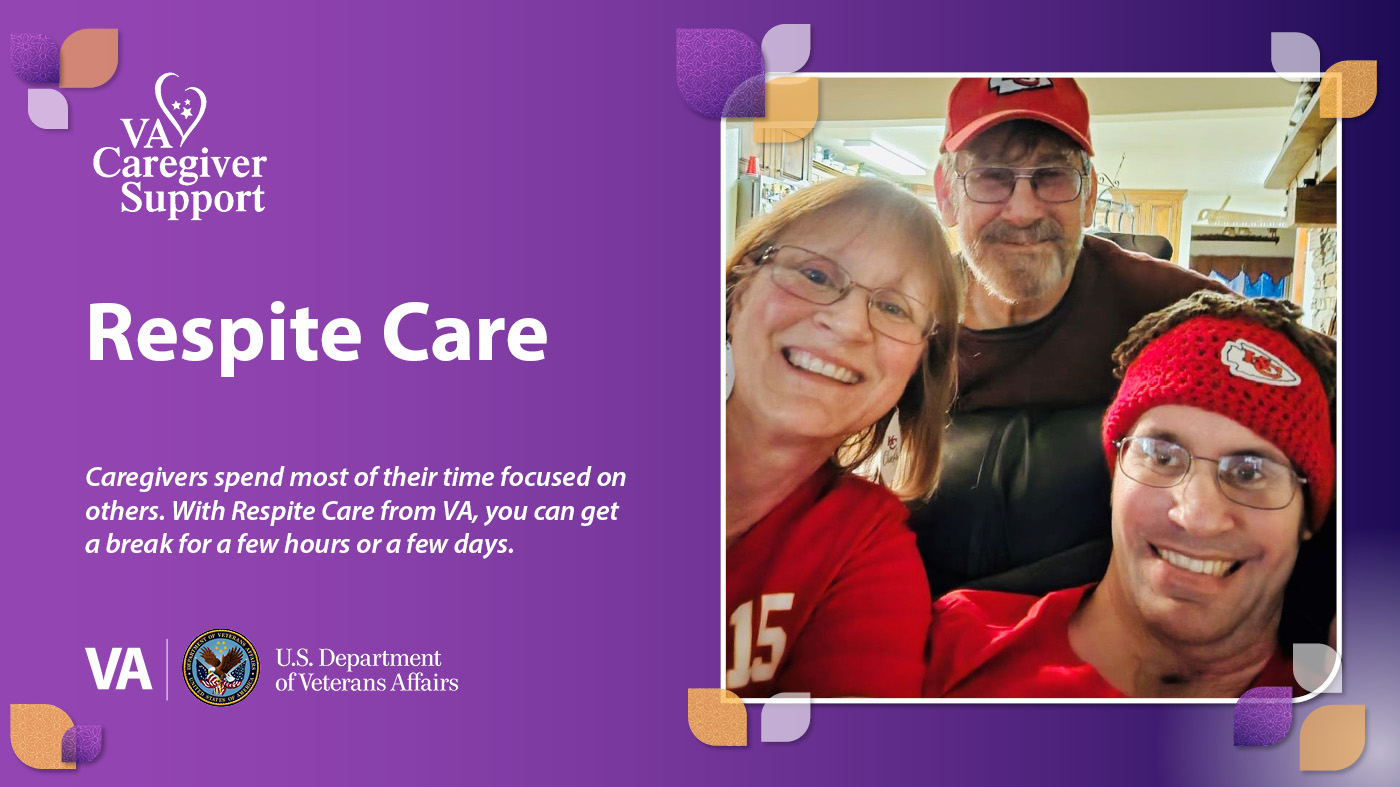Cindy and Lee Stover have been caring for their son, Joe, a Navy Veteran since he was injured in 2009. Joe has a traumatic brain injury and partial paralysis due to a closed fracture of the spine. Cindy and Lee are his legal guardians and are both his full-time caregivers… in need of some respite.
“That’s our baby boy,” Cindy said, “And we just needed to bring him home.”
Cindy and Lee learned about the Caregiver Support Program (CSP) in 2011. They worked with the Caregiver Support team from their local VA facility to see what support the program could offer and find out which of the many available resources would help with their caregiving needs. One of the programs they learned about was respite care.
Make time for yourself
Respite is a period of rest or a break from caregiving. Whether it’s for a few hours or a few days, respite can help caregivers take time for themselves. CSP encourages every caregiver to incorporate respite into their lives. Cindy credits the transformative impact of respite care and VA services with helping her alleviate some of the challenges that come with caregiving.
“I get to go out and mow my lawn. I have lots of flower beds that I play in all the time and do craft shows. Lee and I also go to nursing homes and play music for the older folks,” she shared.
There are three types of respite: Self-guided, informal and formal.
- Self-guided respite is the practice of building a self-focused activity into your normal day. An example of this could be waking up early or staying up later to engage in an activity that nurtures your spiritual, emotional or physical health. It could be as simple as taking a few moments to meditate or pray, take a walk, journal or read a book.
- Informal respite is help from friends or loved ones. It can include direct assistance with caring for your Veteran or it could be assistance with other daily tasks. For example: Your Veteran’s longtime friend might visit once or twice a week to talk or play games with them.
- Formal respite care is short-term, paid assistance from a professional. Formal respite care can be used to take a break, run errands or take a vacation.
How to make respite care work for you
Some caregivers like Cindy and Lee use respite care to help with carving out a piece of the day for self-care. “We all need a little bit of time just to look back and sit out on the porch and drink a cup of coffee… and relax for a little bit,” Lee said.
Cindy advises other caregivers to use respite care, “Because it’s important that they take care of themselves so they can take care of their loved one.” She also acknowledged that it can be hard to find the right fit, but encouraged other caregivers to keep trying. “Our caregiver support team has gone far and beyond what we have ever expected from this journey. If I need something, they’re always there.”
Cindy gardens and participates in crafts to support her mental health. Lee plays music and tinkers with old trucks. Find what works for you and your caregiving journey. See Cindy’s interview.
About respite care
CSP encourages caregivers to take some time away and recharge. Explore your respite goals and establish a personalized respite plan using the Caregiver Respite Tool. If you are interested in participating in formal respite care options, learn more at the Geriatrics and Extended Care’s website. Additionally, VA’s comprehensive self-care tools and Whole Health Library offer tips and support for coping with burnout and how to recharge.
About the Caregiver Support Program (CSP)
CSP promotes the health and well-being of Veterans’ caregivers through education, resources, support and services. Every VA medical center has a CSP team that provides valuable information about resources to help caregivers stay informed and supported as they support Veterans. More information can be found on CSP’s website and by contacting local CSP teams. To learn more, watch CSP’s SITREP podcast.
Topics in this story
Link Disclaimer
This page includes links to other websites outside our control and jurisdiction. VA is not responsible for the privacy practices or the content of non-VA Web sites. We encourage you to review the privacy policy or terms and conditions of those sites to fully understand what information is collected and how it is used.
More Stories
Bob Jesse Award celebrates the achievements of a VA employee and a team or department that exemplifies innovative practices within VA.
The Medical Foster Home program offers Veterans an alternative to nursing homes.
Watch the Under Secretary for Health and a panel of experts discuss VA Health Connect tele-emergency care.







Why do some veterans get approve for the caregiver program and my caregiver has been turn down Five Times because I Clean myself after I use the Bathroom!!!!! Others Drive , Walk, Shopping and a lot more!!!!
This is great qi know and hope that never have to use it.
Very informative and needed information for me, there is sung I need to learn as a caregiver for my veteran brother and my non-veteran husband. Looking forward to learning more about the respite program.